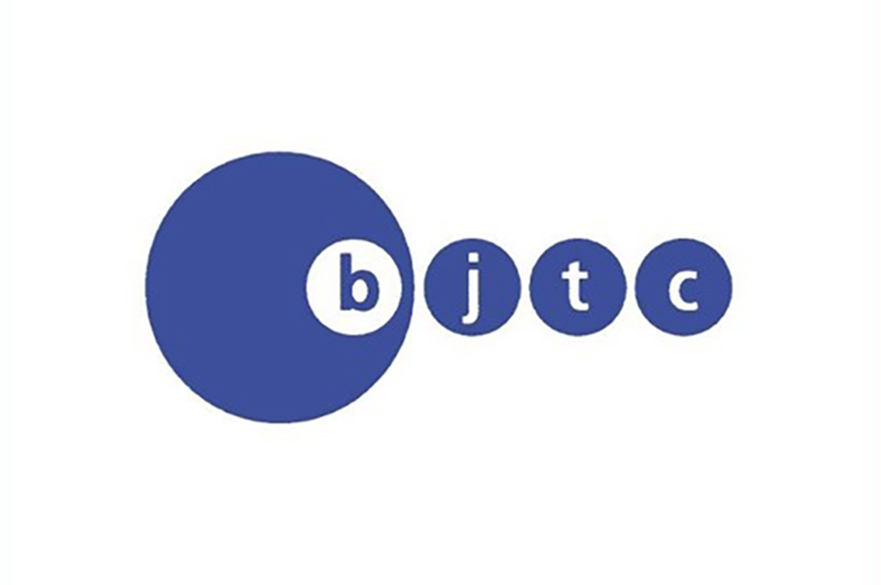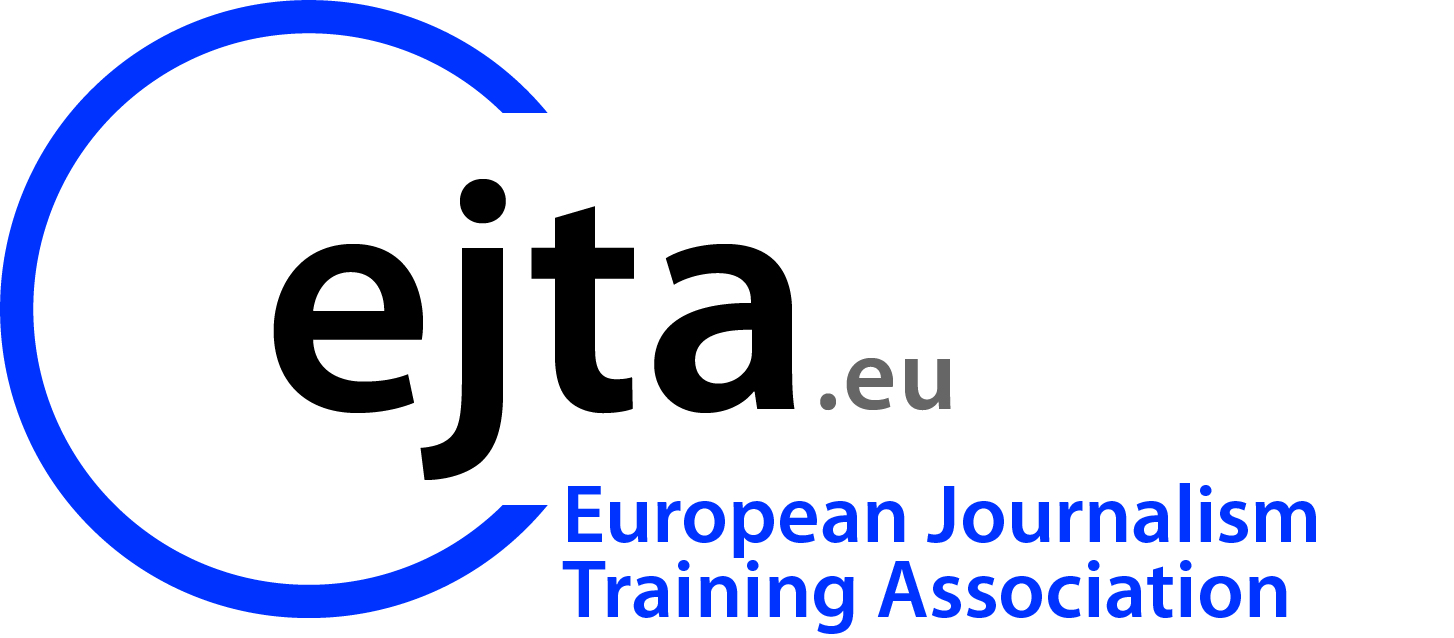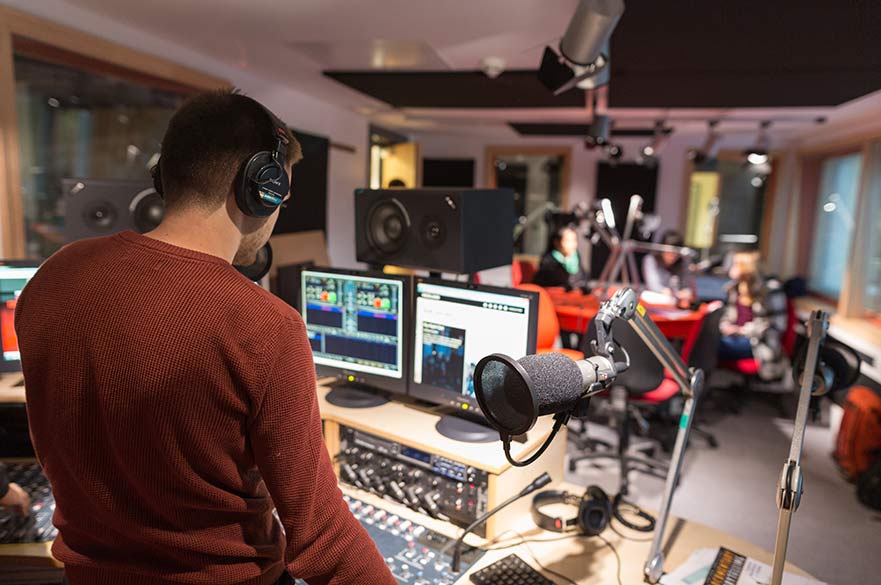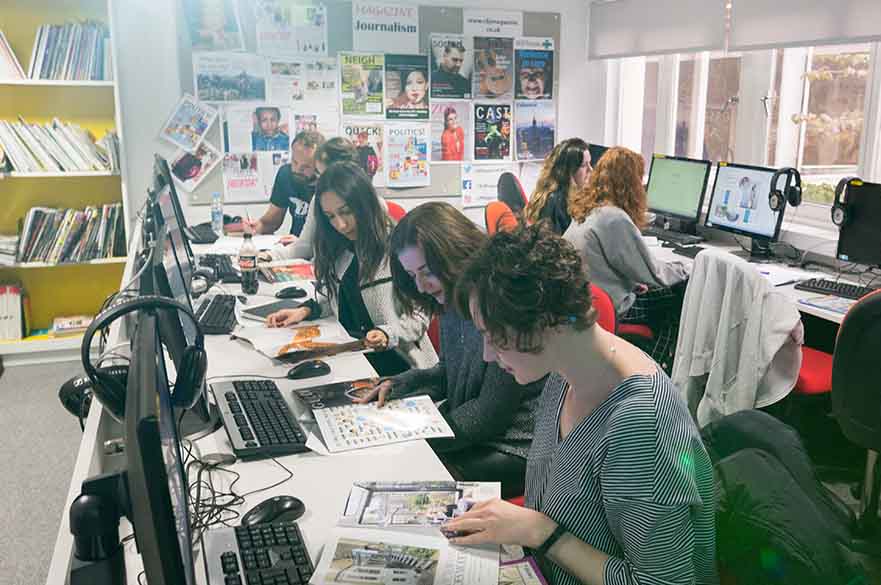Broadcast Journalism MA
About this course
Welcome to the transformative MA Broadcast Journalism, a dynamic fusion of hands-on training and academic excellence tailored for postgraduates.
This program uniquely marries the fast-paced world of multimedia broadcast journalism with a strong academic foundation, accredited by the Broadcast Journalism Training Council (BJTC).
Guided by seasoned broadcast news experts, you'll master the art of newsgathering, radio and TV reporting, video production, audio recording, and social media journalism. With cutting-edge facilities and industry-standard studios, you'll craft compelling content for digital, radio, and TV platforms.
Dive into media law, politics, and personalized options, enhancing your adaptability. Design and execute an impactful research-driven project in your chosen media realm.
Our unparalleled industry connections offer invaluable work experience, propelling you into leading UK and global broadcast roles. Elevate your expertise, shape the future of journalism, and excel in a thriving media landscape."
Industry recognition

We are proud to be part of the BAFTA Albert education partnership

This course is accredited by the Broadcast Journalism Training Council

All Journalism courses at NTU are recognised by the European Journalism Training Association
Find out what it's like to be a postgraduate journalism student at NTU
What you’ll study
-
Broadcast Production Skills (60 credit points)
Step into the dynamic world of multiplatform journalism with this advanced module. It equips you with career-centric skills for thriving in radio or TV newsrooms. Learn the art of research, interviewing, broadcast writing, and dive into technical prowess with audio-video gear, editing, and studio operation. Discover the power of online journalism, social media finesse, and content creation. From nailing news bulletins to producing engaging video packages, this module hones your proficiency. You'll even complete a hands-on placement, putting theory into practice. Elevate your storytelling, digital presence, and broadcast finesse, all in one transformative journey.
Media Law and Ethics (20 credit points)
Enter the dynamic world of media law to grasp its impact and scope. You will acquire the essential professional compliance skills and practical know-how to allow you to navigate areas like defamation, privacy, and copyright. Develop critical understanding of key legal principles for various journalistic platforms and gain practical skills in recognizing publication risks and amending content. Explore the effects of reporting restrictions on journalism to elevate your legal awareness and excel in the media landscape.
Public Affairs for Journalists (20 credit points)
This module immerses you in the inner workings of local and central government. Uncover political dynamics, master journalism skills, and navigate interviews with officials, while getting hands-on experience crafting news features on government topics. From power divisions to EU post-Brexit dynamics, you'll dissect it all. Elevate your reporting with practical insights and lingo mastery, all while gaining a fresh perspective on political landscapes.
Broadcast Journalism Project (60 credits)
Elevate your journalism prowess by unleashing your investigative skills in this module designed for professionals. Dive into comprehensive research, crafting impactful radio/TV journalism complemented by an online version. Harness advanced interview techniques, recording, and editing to produce a well-analyzed piece with interviews, shedding light on your chosen subject. Then translate it into online brilliance, adapting seamlessly to the digital sphere. Elevate your reporting, leaving a mark with expertly produced, multi-platform journalism.
Choose one
Journalism, Ethics and Society (20 credit points)
This module delves into contemporary journalism's concepts and theories. Unravel the societal impact, ethics, and changing landscape and dive into power dynamics, media's role in democracy, and ethical quandaries. Explore the influence of social media on journalism, from misinformation to source accessibility. Gain critical insights and a responsible journalist's perspective for today's world.
Social Media and Audience Analytics (20 credit points)
Get ready for a captivating module with dual themes. Explore the dynamic realm of social media's impact on journalism and society through critical discourse, drawing from journalism research, media studies, and ethics. Uncover practical tools to craft compelling social media content, backed by audience analytics to elevate your critical thinking, questioning, and creative prowess.
Sport: Challenges and Controversy (20 credit points)
From ancient civilizations to today, delve into sports' cultural, social, and political contexts. Unearth the origins of global sports, witness their transformation, and discover how societal values impact their development. With iconic figures like Pierre de Coubertin and Jackie Robinson, you will uncover the economic, political, and cultural impact of sports on society. Join us to unravel the profound significance and captivating stories woven into the tapestry of sports history.
Podcasting Production (20 credit points)
Immerse in podcasting's dynamics: theory, production, and impact. Master skills for crafting professional podcasts. Explore the intersection of traditional audio with contemporary journalism, while you probe popular narratives, context, and economics. Learn from experts, grasp the podcasting landscape, and hone your podcasting prowess.
Data-driven Investigations (20 credit points)
Discover data-led investigative projects in journalism. Explore the fusion of industry practice and theoretical discourse to gauge the impact of data journalism on society. Uncover new digital methods to power your research and enhance your multiplatform storytelling abilities. Delve into the world of open data and alternative sources of information. Gain the skills to analyse, understand, and interpret statistical data for your news audience. Create compelling journalistic content from data-driven insights.
We regularly review and update our course content based on student and employer feedback, ensuring that all of our courses remain current and relevant. This may result in changes to module content or module availability in future years.
Don’t just take our word for it, hear from our students themselves
How you're taught
Study methods and assessments
Study methods on this course include practical sessions, project work and independent learning, as well as tutorials, lectures and seminars.
This practical course enables you to develop story ideas and contacts, gathering your own material for journalistic work. Online production is integral with a focus on multimedia skills development required by the industry.
Placements give you the chance to work in radio, television and online news organisations.
You will be assessed by a mixture of portfolio work, essays, exams and presentations. MA students are required to complete the multi-platform project which includes a radio or TV documentary, an online feature and a research essay.
Work experience
Real-world learning is at the heart of your journey. Immerse yourself in 15 live Newsdays, crafting radio and TV content to broadcast and online platforms. Guided by industry giants like BBC and SKY News, you'll gain hands-on experience, aligning with Broadcast Journalism Training Council standards.
Your pinnacle capstone project crosses two broadcast media platforms, eligible for industry programs and awards. Our proven success stories have landed students prestigious awards and coveted jobs.
Elevate your career with a minimum 21-day placement in renowned broadcast organizations and PR firms, nationally and globally. A world of practical experience awaits.
Learn a new language
Alongside your study, you also have the opportunity to learn a new language. The University Language Programme (ULP) is available to all students and gives you the option of learning a totally new language or improving the skills you already have. Learning a new language can enhance your communication skills, enrich your experience when travelling abroad; and boost your career prospects. Find out more about the University Language Programme.
Further information
Expert teaching staff
Our staff all have experience in broadcasting, and many of our news days are led by guest broadcasters from the BBC and commercial stations.
Dr Emma Hemmingway is the Course Leader for the MA in Broadcast Journalism. She worked as a TV and radio news and TV documentary producer for the BBC at both regional and national levels for 12 years, before joining NTU as a senior lecturer. She is the author of the book Into the Newsroom, published by Routledge in 2008. She has also co-authored several book chapters and conference papers. She is also currently writing a book on Social Media and Actor Network theory.
Careers and employability
Your career development
Employability is a key focus of this course, with many of the compulsory modules including initiatives to help enhance you future career in journalism. This course also has established links with its former students, through which we receive employment opportunities for graduating students. After studying this course you could go into a variety of roles including:
- producer (radio, TV, online);
- editor, sub-editor;
- journalist;
- presenter, reporter, news commentator;
- camera operators;
- production manager, floor manager;
- sound engineer, lighting engineer, technician, technical assistant; and
- researcher.
Recent graduates from this course have gone on to work for companies including:
- BBC;
- ITN;
- Sky News;
- Channel 5 News;
- BBC Five Live;
- BBC Asian Network;
- BAFTA;
- Gem 106;
- BBC Radio Nottingham;
- Free Radio Birmingham; and
- BBC Midlands Today.
As well as careers in journalism, graduates have also gone on to work in PR, marketing and advertising. Many graduates have joined or started local small and medium enterprises to undertake journalism, creative or media related activities. Students are expected to undertake a minimum of three weeks of placements normally in the UK but potentially anywhere in the world. They are usually undertaken during vacation periods.
Placements allow you to use, in front of professionals, many of the skills and much of the knowledge and understanding you will acquire while studying at the Centre for Broadcasting and Journalism (CBJ). Every newsroom has its own distinctive way of working and it's important that students experience these different ways.
We do not guarantee to find placements for students but have placement partnerships with various organisations including Sky; BBC East Midlands; ITV Central (East and West); Independent Local Radio and BBC Radio.
Campus and facilities
Our award-winning range of journalism courses are based in the Centre for Broadcasting & Journalism, centrally placed on our City Campus. This multi-million pound development includes one of the largest student newsrooms in the UK, a fully functioning TV studio with production facilities and three radio studios. We have a team of six full-time engineers who work in conjunction with lecturers to train you on the industry standard. Find out more ...
Entry requirements
UK students
Academic entry requirements: 2.1 honours degree and enthusiasm for, or experience of journalism.
Applicants with a 2.2 and substantial experience will be considered.
Applications from candidates with non-standard entry qualifications will be considered on an individual basis if they can demonstrate relevant professional experience.
Other requirements: All journalism applicants will be asked to submit a written piece as part of their application. View written test. This will be judged against clear criteria. When assessing sample writing manuscripts we are looking for work of at least a satisfactory (pass) standard in terms of language, content, observation, structure and voice.
Additional requirements for UK students
There are no additional requirements for this course.
Other qualifications and experience
We welcome applications from students with non-standard qualifications and learning backgrounds and work experience. We consider credit transfer, vocational and professional qualifications, and any work or life experience you may have.
You can view our Recognition of Prior Learning and Credit Transfer Policy which outlines the process and options available, such as recognising experiential learning and credit transfer.
Getting in touch
If you need more help or information, get in touch through our enquiry form.
International students
Academic entry requirements: 2.1 honours degree and enthusiasm for, or experience of journalism.
Applicants with a 2.2 and substantial experience will be considered.
We accept equivalent qualifications from all over the world. Please check your international entry requirements by country.
Other requirements: All journalism applicants will be asked to submit a written piece as part of their application. View written test. This will be judged against clear criteria. When assessing sample writing manuscripts we are looking for work of at least a satisfactory (pass) standard in terms of language, content, observation, structure and voice.
English language requirements: See our English language requirements page for requirements for your subject and information on alternative tests and Pre-sessional English.
Additional requirements for international students
If you need help achieving the academic entry requirements, we offer a Pre-Masters course for this degree. The course is offered through our partner Nottingham Trent International College (NTIC) based on our City Campus.
English language requirements
View our English language requirements for all courses, including alternative English language tests and country qualifications accepted by the University.
If you need help achieving the language requirements, we offer a Pre-Sessional English for Academic Purposes course on our City campus which is an intensive preparation course for academic study at NTU.
Other qualifications and experience
We welcome applications from students with non-standard qualifications and learning backgrounds and work experience. We consider credit transfer, vocational and professional qualifications, and any work or life experience you may have.
You can view our Recognition of Prior Learning and Credit Transfer Policy which outlines the process and options available, such as recognising experiential learning and credit transfer.
Sign up for emails
Sign up to receive regular emails from the International Office. You'll hear about our news, scholarships and any upcoming events in your country with our expert regional teams.
Getting in touch
If you need advice about studying at NTU as an international student or how to apply, our international webpages are a great place to start. If you have any questions about your study options, your international qualifications, experience, grades or other results, please get in touch through our enquiry form. Our international teams are highly experienced in answering queries from students all over the world.
Policies
We strive to make our admissions procedures as fair and clear as possible. To find out more about how we make offers, visit our admissions policies page.









